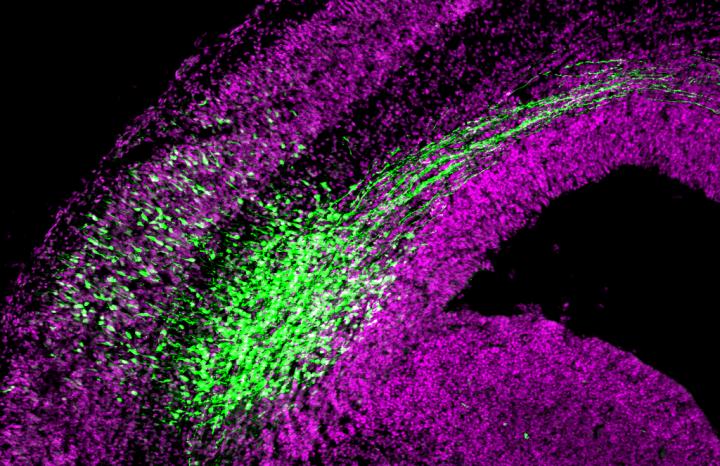
Credit: Source: Helmholtz Zentrum München
The use of stem cells to repair organs is one of the foremost goals of modern regenerative medicine. Scientists at Helmholtz Zentrum München and Ludwig Maximilian University of Munich (LMU) have discovered that the protein Akna plays a key role in this process. It controls, for example, the behavior of neural stem cells via a mechanism that may also be involved in the formation of metastases. The study was published in the renowned journal ‘Nature‘.
The research team led by Prof. Dr. Magdalena Götz, director of the Institute for Stem Cell Research (ISF) at Helmholtz Zentrum München and Chair of Physiological Genomics of the LMU Biomedical Center, wanted to identify the factors that regulate the maintenance or differentiation of neural stem cells. To this end, the scientists isolated neural stem cells, which either self-renew and generate additional neural stem cells or differentiate. “We found that the Akna protein* is present in higher concentrations in stem cells that generate neurons,” explains ISF researcher German Camargo Ortega, first author of the study together with Dr. Sven Falk. “Our experiments showed that low levels of the Akna protein cause stem cells to remain in the stem cell niche, whereas higher levels stimulate them to detach from the niche, thus promoting differentiation,” the author continues.
The scientists were surprised to discover the position of the protein ? namely at the centrosome, an organelle in the cell’s interior that acts as chief architect for the organization of the cytoskeleton and regulates cell division. “We discovered that an incorrect sequence was originally published for this protein,” Sven Falk reports. “However, our work clearly showed that Akna is located directly at the centrosome.” The researchers were able to show that Akna recruits and anchors microtubules at the centrosome. This weakens the connections to neighboring cells, and promotes detachment and migration from the stem cell niche.
“Our experiments show that this function also plays an important role in a process known as epithelial-to-mesenchymal transition, or EMT for short**”, explains the study leader Magdalena Götz. “In this process, cells detach from a cluster, proliferate and begin to migrate. This occurs, for example when stem cells migrate to form new neurons, but it can also be harmful in disease, for example when cancer cells leave a tumor to form metastases elsewhere in the body. “The novel mechanism that we identified by studying the function of Akna therefore appears to play a key role in a broad range of medically relevant processes.” In the next step, the research team plans to investigate the role of Akna in other stem cells and in the immune system.
###
Further Information
* The Akna protein is an AT hook transcription factor. A transcription factor is a protein that binds to DNA and regulates the transcription of one or more genes.
** Epithelial-to-mesenchymal transition (EMT) denotes a transition from epithelial cells (e.g. skin, gland tissues or mucous membranes) into cells with mesenchymal properties. Mesenchyma is developing tissue showing a high rate of cell division.
Original Publication:
Germán Camargo Ortega et al (2019): The centrosome protein Akna regulates neurogenesis via microtubule organization. Nature, DOI: 10.1038/s41586-019-0962-4
The Helmholtz Zentrum München, the German Research Center for Environmental Health, pursues the goal of developing personalized medical approaches for the prevention and therapy of major common diseases such as diabetes, allergies and lung diseases. To achieve this, it investigates the interaction of genetics, environmental factors and lifestyle. The Helmholtz Zentrum München is headquartered in Neuherberg in the north of Munich and has about 2,300 staff members. It is a member of the Helmholtz Association, a community of 18 scientific-technical and medical-biological research centers with a total of about 37,000 staff members. http://www.
The Institute of Stem Cell Research (ISF) investigates the basic molecular and cellular mechanisms of stem cell maintenance and differentiation. From that, the ISF then develops approaches in order to replace defect cell types, either by activating resting stem cells or by re-programming other existing cell types to repair themselves. The aim of these approaches is to stimulate the regrowth of damaged, pathologically changed or destroyed tissue. http://www.
As one of Europe’s leading research universities, LMU Munich is committed to the highest international standards of excellence in research and teaching. Building on its 500-year-tradition of scholarship, LMU covers a broad spectrum of disciplines, ranging from the humanities and cultural studies through law, economics and social studies to medicine and the sciences. 15 percent of LMU’s 50,000 students come from abroad, originating from 130 countries worldwide. The know-how and creativity of LMU’s academics form the foundation of the University’s outstanding research record. This is also reflected in LMU’s designation of as a “university of excellence” in the context of the Excellence Initiative, a nationwide competition to promote top-level university research. http://www.
Contact for the media:
Department of Communication, Helmholtz Zentrum München – German Research Center for Environmental Health, Ingolstädter Landstr. 1, 85764 Neuherberg – Tel. +49 89 3187 2238 – Fax: +49 89 3187 3324 – E-mail: [email protected]
Scientific Contact:
Prof. Dr. Magdalena Götz, Helmholtz Zentrum München – German Research Center for Environmental Health, Institute of Stem Cell Research, Ingolstädter Landstr. 1, 85764 Neuherberg – Tel. +49 89 3187 3750 – E-mail: [email protected]
Media Contact
Dr. Magdalena Götz
[email protected]
49-893-187-3750
Original Source
https:/
Related Journal Article
http://dx.




